when,while与as用法之异同
as when while引导时间状语从句的区别
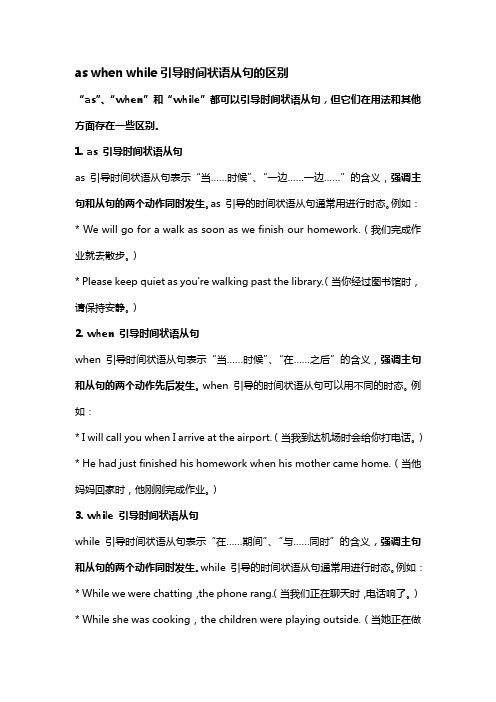
as when while引导时间状语从句的区别“as”、“when”和“while”都可以引导时间状语从句,但它们在用法和其他方面存在一些区别。
1. as 引导时间状语从句as 引导时间状语从句表示“当……时候”、“一边……一边……”的含义,强调主句和从句的两个动作同时发生。
as 引导的时间状语从句通常用进行时态。
例如:* We will go for a walk as soon as we finish our homework.(我们完成作业就去散步。
)* Please keep quiet as you're walking past the library.(当你经过图书馆时,请保持安静。
)2. when 引导时间状语从句when 引导时间状语从句表示“当……时候”、“在……之后”的含义,强调主句和从句的两个动作先后发生。
when 引导的时间状语从句可以用不同的时态。
例如:* I will call you when I arrive at the airport.(当我到达机场时会给你打电话。
)* He had just finished his homework when his mother came home.(当他妈妈回家时,他刚刚完成作业。
)3. while 引导时间状语从句while 引导时间状语从句表示“在……期间”、“与……同时”的含义,强调主句和从句的两个动作同时发生。
while 引导的时间状语从句通常用进行时态。
例如:* While we were chatting,the phone rang.(当我们正在聊天时,电话响了。
)* While she was cooking,the children were playing outside.(当她正在做饭时,孩子们在外面玩耍。
)总之,as、when和while都可以引导时间状语从句,但它们在用法和其他方面存在区别。
英语语法:when, while, as的用法的区别
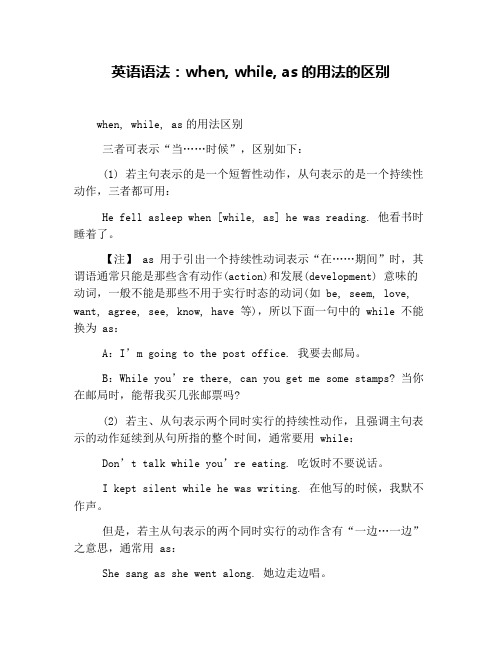
英语语法:when, while, as的用法的区别when, while, as的用法区别三者可表示“当……时候”,区别如下:(1) 若主句表示的是一个短暂性动作,从句表示的是一个持续性动作,三者都可用:He fell asleep when [while, as] he was reading. 他看书时睡着了。
【注】 as 用于引出一个持续性动词表示“在……期间”时,其谓语通常只能是那些含有动作(action)和发展(development) 意味的动词,一般不能是那些不用于实行时态的动词(如 be, seem, love, want, agree, see, know, have 等),所以下面一句中的 while 不能换为 as:A:I’m going to the post office. 我要去邮局。
B:While you’re there, can you get me some stamps? 当你在邮局时,能帮我买几张邮票吗?(2) 若主、从句表示两个同时实行的持续性动作,且强调主句表示的动作延续到从句所指的整个时间,通常要用 while:Don’t talk while you’re eating. 吃饭时不要说话。
I kept silent while he was writing. 在他写的时候,我默不作声。
但是,若主从句表示的两个同时实行的动作含有“一边…一边”之意思,通常用 as:She sang as she went along. 她边走边唱。
(3) 若从句是一个短暂性动作,主句是一个持续性动作,可用as / when 但不用 while:It was raining hard when [as] we arrived. 我们到达时正下着大雨。
(4) 若主从句表示的是两个同时(或几乎同时)发生的短暂性动作,用 as / when:I thought of it just when [as] you opened your mouth. 就在你要说的时候,我也想到了。
(完整版)When,while,as的区别和用法
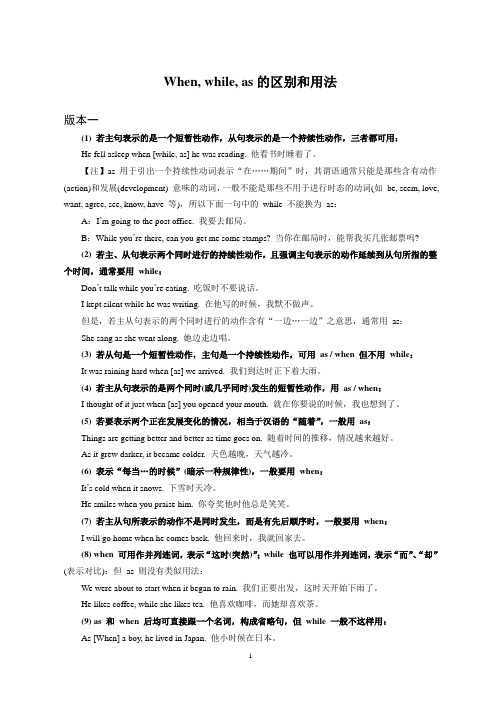
When, while, as的区别和用法版本一(1) 若主句表示的是一个短暂性动作,从句表示的是一个持续性动作,三者都可用:He fell asleep when [while, as] he was reading. 他看书时睡着了。
【注】as 用于引出一个持续性动词表示“在……期间”时,其谓语通常只能是那些含有动作(action)和发展(development) 意味的动词,一般不能是那些不用于进行时态的动词(如be, seem, love, want, agree, see, know, have 等),所以下面一句中的while 不能换为as:A:I’m going to the post office. 我要去邮局。
B:While you’re there, can you get me some stamps? 当你在邮局时,能帮我买几张邮票吗?(2) 若主、从句表示两个同时进行的持续性动作,且强调主句表示的动作延续到从句所指的整个时间,通常要用while:Don’t talk while you’re eating. 吃饭时不要说话。
I kept silent while he was writing. 在他写的时候,我默不做声。
但是,若主从句表示的两个同时进行的动作含有“一边…一边”之意思,通常用as:She sang as she went along. 她边走边唱。
(3) 若从句是一个短暂性动作,主句是一个持续性动作,可用as / when 但不用while:It was raining hard when [as] we arrived. 我们到达时正下着大雨。
(4) 若主从句表示的是两个同时(或几乎同时)发生的短暂性动作,用as / when:I thought of it just when [as] you opened your mouth. 就在你要说的时候,我也想到了。
高考英语词汇讲解:as,when,while的用法区别详解
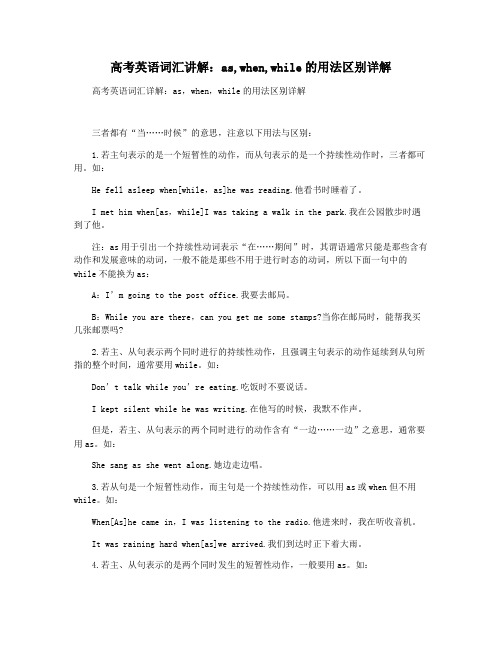
高考英语词汇讲解:as,when,while的用法区别详解高考英语词汇详解:as,when,while的用法区别详解三者都有“当……时候”的意思,注意以下用法与区别:1.若主句表示的是一个短暂性的动作,而从句表示的是一个持续性动作时,三者都可用。
如:He fell asleep when[while,as]he was reading.他看书时睡着了。
I met him when[as,while]I was taking a walk in the park.我在公园散步时遇到了他。
注:as用于引出一个持续性动词表示“在……期间”时,其谓语通常只能是那些含有动作和发展意味的动词,一般不能是那些不用于进行时态的动词,所以下面一句中的while不能换为as:A:I’m going to the post office.我要去邮局。
B:While you are there,can you get me some stamps?当你在邮局时,能帮我买几张邮票吗?2.若主、从句表示两个同时进行的持续性动作,且强调主句表示的动作延续到从句所指的整个时间,通常要用while。
如:Don’t talk while you’re eating.吃饭时不要说话。
I kept silent while he was writing.在他写的时候,我默不作声。
但是,若主、从句表示的两个同时进行的动作含有“一边……一边”之意思,通常要用as。
如:She sang as she went along.她边走边唱。
3.若从句是一个短暂性动作,而主句是一个持续性动作,可以用as或when但不用while。
如:When[As]he came in,I was listening to the radio.他进来时,我在听收音机。
It was raining hard when[as]we arrived.我们到达时正下着大雨。
When, while, as的区别和用法
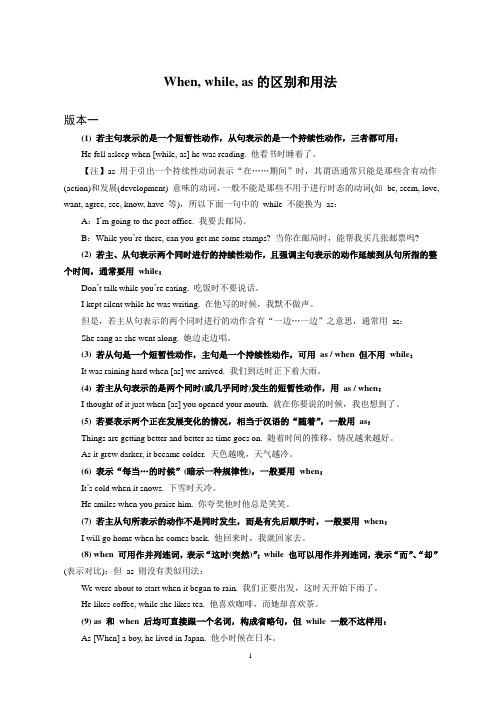
When, while, as的区别和用法版本一(1) 若主句表示的是一个短暂性动作,从句表示的是一个持续性动作,三者都可用:He fell asleep when [while, as] he was reading. 他看书时睡着了。
【注】as 用于引出一个持续性动词表示“在……期间”时,其谓语通常只能是那些含有动作(action)和发展(development) 意味的动词,一般不能是那些不用于进行时态的动词(如be, seem, love, want, agree, see, know, have 等),所以下面一句中的while 不能换为as:A:I’m going to the post office. 我要去邮局。
B:While you’re there, can you get me some stamps? 当你在邮局时,能帮我买几张邮票吗?(2) 若主、从句表示两个同时进行的持续性动作,且强调主句表示的动作延续到从句所指的整个时间,通常要用while:Don’t talk while you’re eating. 吃饭时不要说话。
I kept silent while he was writing. 在他写的时候,我默不做声。
但是,若主从句表示的两个同时进行的动作含有“一边…一边”之意思,通常用as:She sang as she went along. 她边走边唱。
(3) 若从句是一个短暂性动作,主句是一个持续性动作,可用as / when 但不用while:It was raining hard when [as] we arrived. 我们到达时正下着大雨。
(4) 若主从句表示的是两个同时(或几乎同时)发生的短暂性动作,用as / when:I thought of it just when [as] you opened your mouth. 就在你要说的时候,我也想到了。
when.whileas的区别用法
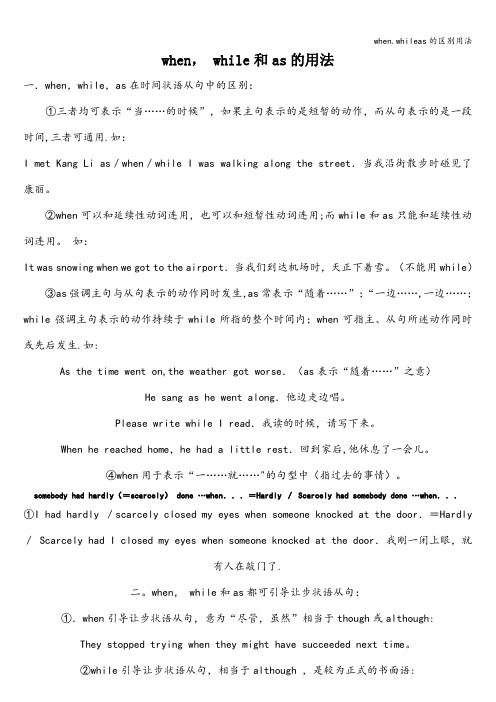
when, while和as的用法一.when,while,as在时间状语从句中的区别:①三者均可表示“当……的时候”,如果主句表示的是短暂的动作,而从句表示的是一段时间,三者可通用.如:I met Kang Li as/when/while I was walking along the street.当我沿街散步时碰见了康丽。
②when可以和延续性动词连用,也可以和短暂性动词连用;而while和as只能和延续性动词连用。
如:It was snowing when we got to the airport.当我们到达机场时,天正下着雪。
(不能用while)③as强调主句与从句表示的动作同时发生,as常表示“随着……”;“一边……,一边……;while强调主句表示的动作持续于while所指的整个时间内;when可指主、从句所述动作同时或先后发生.如:As the time went on,the weather got worse.(as表示“随着……”之意)He sang as he went along.他边走边唱。
Please write while I read.我读的时候,请写下来。
When he reached home,he had a little rest.回到家后,他休息了一会儿。
④when用于表示“一……就……"的句型中(指过去的事情)。
somebody had hardly(=scarcely)done …when...=Hardly /Scarcely had somebody done …when...①I had hardly /scarcely closed my eyes when someone knocked at the door.=Hardly / Scarcely had I closed my eyes when someone knocked at the door.我刚一闭上眼,就有人在敲门了.二。
when, while, as的用法区别

when, while, as的用法区别这三个词都可表示“当……时候”,注意以下用法与区别:1.若主句表示的是一个短暂性的动作,而从句表示的是一个持续性动作时,三者都可用。
如:He fell asleep when [while, as] he was reading. 他看书时睡着了。
I met him when [as, while] I was taking a walk in the park. 我在公园散步时遇到了他。
注:a s 用于引出一个持续性动词表示“在……期间”时,其谓语通常只能是那些含有动作(action)和发展(development) 意味的动词,一般不能是那些不用于进行时态的动词(如be, seem, love, want, agree, see, know, have 等),所以下面一句中的while 不能换为as:A:I’m going to the post office. 我要去邮局。
B:W hile you are there, can you get me some stamps? 当你在邮局时,能帮我买几张邮票吗?2.若主、从句表示两个同时进行的持续性动作,且强调主句表示的动作延续到从句所指的整个时间,通常要用while。
如:Don’t talk while you’re eating. 吃饭时不要说话。
I kept silent while he was writing. 在他写的时候,我默不作声。
但是,若主、从句表示的两个同时进行的动作含有“一边……一边”之意思,通常要用as。
如:She sang as she went along. 她边走边唱。
3.若从句是一个短暂性动作,而主句是一个持续性动作,可以用as 或when 但不用while。
如:When [As] he came in, I was listening to the radio. 他进来时,我在听收音机。
英语语法:时间状语从句中when,while,as的区别有哪些
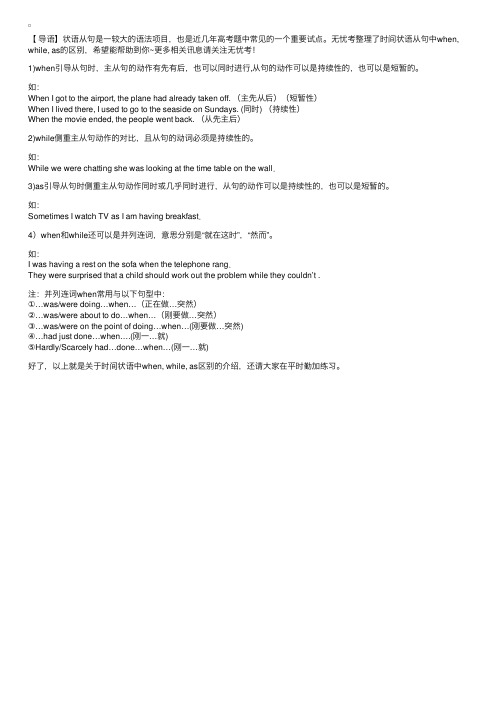
【导语】状语从句是⼀较⼤的语法项⽬,也是近⼏年⾼考题中常见的⼀个重要试点。
⽆忧考整理了时间状语从句中when, while, as的区别,希望能帮助到你~更多相关讯息请关注⽆忧考!1)when引导从句时,主从句的动作有先有后,也可以同时进⾏,从句的动作可以是持续性的,也可以是短暂的。
如:When I got to the airport, the plane had already taken off. (主先从后)(短暂性)When I lived there, I used to go to the seaside on Sundays. (同时) (持续性)When the movie ended, the people went back. (从先主后)2)while侧重主从句动作的对⽐,且从句的动词必须是持续性的。
如:While we were chatting she was looking at the time table on the wall.3)as引导从句时侧重主从句动作同时或⼏乎同时进⾏,从句的动作可以是持续性的,也可以是短暂的。
如:Sometimes I watch TV as I am having breakfast.4)when和while还可以是并列连词,意思分别是“就在这时”,“然⽽”。
如:I was having a rest on the sofa when the telephone rang.They were surprised that a child should work out the problem while they couldn’t .注:并列连词when常⽤与以下句型中:①…was/were doing…when…(正在做…突然)②…was/were about to do…when…(刚要做…突然)③…was/were on the point of doing…when…(刚要做…突然)④…had just done…when….(刚⼀…就)⑤Hardly/Scarcely had…done…when…(刚⼀…就)好了,以上就是关于时间状语中when, while, as区别的介绍,还请⼤家在平时勤加练习。
- 1、下载文档前请自行甄别文档内容的完整性,平台不提供额外的编辑、内容补充、找答案等附加服务。
- 2、"仅部分预览"的文档,不可在线预览部分如存在完整性等问题,可反馈申请退款(可完整预览的文档不适用该条件!)。
- 3、如文档侵犯您的权益,请联系客服反馈,我们会尽快为您处理(人工客服工作时间:9:00-18:30)。
when,while与as用法之异同■崔长平河南遂平一高(463100)1.从表示的时间概念来说,这三个词的共同特点是:它们所引起的从句都可以表明主句动作发生在某一段时间或某一活动过程之中。
这时它们可以互换使用。
此时从句中的谓语动词是延续性的。
e.g. As ∕When ∕While he talked on, he got more and more excited.He was fond of swimming when ∕ while ∕as he was yet a child.(如果主句动作发生在某一时刻,即一个时间点上,这时的时间状语从句可用when或as来引导,不能使用while来引导,而且谓语动词多是非延续性的。
)e.g. When he arrived in Beijing, it happened to be raining.When he returned from work, his wife was cooking.The runners started as the gun went off.He raised his hat when he saw her.What were you doing when I called you on the phone last night.I will give it to my mother when she is back.2.就从句动作与主句动作发生的时间关系来说,when引导的从句的动作与主句的动作可以是同时或几乎同时发生的,也可以是一先一后发生的,而while和as引导的从句的动作与主句的动作一般都是同时发生的,也就是说主句动作限定在从句所表示的时间范围内。
e.g. On one occasion, when a boy, I went fishing with other boys.He turned off the light and went to bed when he finished his work.I read the book as I walked along.He was only ten when he began to work for the boss.She will take the letter to the post office when she has finished it.When the firemen got there, the fire had been put out.When she saw the mouse, she screamed.Strike while the iron is hot.Work while you work, play while you play.While ants grow, they change their form three times.Crusoe hurried home, looking behind as he went.You will grow wise as you grow older.As he looked at the note, his smile froze.3.从说话的着眼点来说,我们也可以看出这三个词的差异:when引导的从句着意于主句动作发生在某一特定时间。
e.g. When he heard the good news, he was very happy.When the boy saw the soldiers, he stopped working on the branch.另外,when含有“每当……的时候”,“在任何……的时候”之意,条件意味较浓,这时不可换为while 或 as。
e.g.It is cold when it snows.She smiles when you praise her.while引导的从句注重说明主句的动作发生在某一段时间内,同时它也侧重说明过程。
e.g.It often changes in speed and direction while it is moving.She wept while she spoke.as引导的从句强调主句与从句的行为同时发生或同时进行(伴随发生或进行)。
e.g. Tom laughed as he spoke.The clock was striking twelve as I walked down the street.As she sang, tears ran down her cheeks.4.当主句的主语和从句的主语同指一个人或事物时,三者都可以后接缩略形式。
1)when后可接:①名词或名词词组e.g.When a child, he used to go to play on the sea.②形容词e.g.If you lie upon roses when young, you will lie upon thorns when old.③介词短语e.g.When at Rome do as the Romans do.④现在分词(与句子的主语呈现逻辑上主动的主谓关系)或过去分词(与句子的主语呈现逻辑上被动的主谓关系)e.g.He gave no answer when asked what to do next.We wear plimsolls when doing physical exercises at school.When having finished his work,he went to bed and turned off the light.2)while后可接:①名词或名词词组e.g.Tom, while yet a youth, gained the prize in an international contest.②形容词e.g.He died while asleep.③介词短语e.g.While in London Lenin closely studied the English labor movement.④现在分词(用法同when)e.g.While reading, he always makes notes.His fingers trembled while doing so.3)as后一般只接名词或名词词组e.g.As a young man, he was a store keeper and later a postmaster.5.when,while,as的一些特殊用法:when①when可以表示“当某一动作将要发生、正在发生或刚刚发生,另一动作随之突然发生”。
这时when 相当于一个并列连词,位置在两分句之间。
意为and then,just at this time,and suddenly。
也有人把这种用法称为“表示突然性的when分句”。
(when之前的分句一般使用完成时、进行时和将来时,注意研究例句中时态的使用。
)e.g. An Arab was walking alone through the desert when he met two men.She just sat down for a rest, when she saw a dark shadow steal into the house.We were going to start when it rained.I was walking along the road when suddently someone patted me on the shoulder from behind. He had just finished his work when the telephone rang.They were about to leave when a little boy ran into the office.②when还可以表示“还没有……就……”,“刚刚……就……”这种意义。
这时when的位置也是处在两分句之间。
when之前的那一个分句一般含有否定意义。
e.g. I had not been there for half an hour when I heard steps outside.I had hardly opened the door when he hit me. (hardly…when…)I had scarcely come in when the phone rang. (scarcely…when…)③when从句可以用来表示条件,意义相当于if。
e.g. When the waste water from factories is made clean and used again,a lot of money is saved.while①while也可以用作并列连词,表示对比与转折。
意为“然而”,“却”,“但是”。
e.g. He observed that feathers fell to the ground slowly,while stones fell much faster.I do every bit of housework while my husband Bob just washes the dishes now and then.In some places women are expected to earn money while men work at home and raise their children.②while可以表示“尽管”,“虽然”之含义,多置于句首。
e.g. While I like the color of the hat, I do not like its shape.While I admit that the problem is difficult,I don’t think that it can’t be solved.asas引导的时间状语从句,强调主从句两动作同时发生或伴随发生。
常译作“随着……”,“一边……一边……”,“一……就……”。
e.g. He rose as she entered.We get wiser as we get older.As time went on, his theory proved to be correct.。
